Pinecone Research Scam
Published on October 1, 2013, Updated on December 11, 2018
Published on October 1, 2013, Updated on December 11, 2018

You may have been contacted by what seems to be Pinecone Research, to participate in a mystery shopping assignment or to take online surveys worth a lot of money. You may also have been mailed a fake check in what has been dubbed, Pinecone Research check fraud. If these apply to you, be careful – scammers posing as Pinecone Research have been running a serious scam where many victims have lost a lot of money to these thieves.
February, 2018 update – fake Pinecone Research emails for Walmart assignments supposedly paying $500 a piece are circulating across the USA.
February, 2015 update – fake Pinecone Research secret shopper e-mails are circulating. Reply, and you’ll receive a letter with a fake check for a very large sum of money.
October, 2014 update – fake e-mails promising $300 per project study are being mass mailed to people across the USA.
June, 2014 update – scammers targeting USA residents are sending out e-mails again asking that $1550 be wired to a Western Union account.
May, 2014 update – scammers targeting USA residents have once again been sending out e-mails using Pinecone Research’s name. Checks in the amount of $1900 are being promised, with $1550 to be wired to a Western Union account.
February, 2014 update – scammers pretending to be Pinecone Research have been sending out e-mails to USA residents asking them to participate in an evaluation survey on Western Union outlet services.
October, 2013 update – scammers pretending to be Pinecone Research tend to be referencing mystery shopping assignments, or “business surveys” worth $150 a piece in the e-mails and letters they have been sending.
As per our article, I Received a Big Check From a Survey Company. Is it Real?, if you’ve received an unexpected check in the mail from Pinecone Research (most typically for a sum of more than $1000), it is almost certainly fake. In fact, anytime you receive an unexpected check in the mail, you should question its authenticity. Big companies don’t just issue checks for fun, so before you get too excited and try to cash it, know that you could be putting your own money at risk by doing so.
Don’t get caught paying an NSF fee!
Did you know that even if you don’t wire money to anyone, but still deposit the check, you could be faced with a fee from your bank for depositing a NSF (non sufficient funds) check! Not only will the check bounce, but you could face fees of anywhere from $10-$35!
This might seem obvious, but if you’re asked to send money, the check is fake. No matter how great the hologram on the check, no matter if your bank actually accepts the check to be deposited – the check WILL BOUNCE. Meanwhile, if you were instructed to wire money to Western Union or MoneyGram, and you actually do so, you will never see this money again. These types of accounts are extremely difficult to trace and wired money is almost never recoverable.

Fact: Pinecone Research WILL NEVER ask you to send them money.
In fact, Pinecone Research has a security notice about this issue posted on their website here: https://www.pineconeresearch.com/security-notice.asp
Even if an actual person picks up on the other line, rest assured they do not work for Pinecone Research! Serious scammers will go to great lengths to convince their victims that they are genuine. If you get an actual person on the line, quickly alert your local authorities. Part of the problem in prosecuting these types of scammers is that they are somewhat fly-by-night operations. The phone number may only work for a few days, so the more information and leads law officials have to go on, the better the chances of catching these criminals in the act. The real Pinecone Research does not talk to its survey takers over the phone, and are actually owned by a company called Nielsen.
They didn’t, and it’s a coincidence that you’ve been contacted by these fraudsters. Pinecone Research has hundreds of thousands of members, so it’s almost guaranteed that some of the people contacted will be actual members of the Pinecone Research survey panel. You were probably contacted by chance, as your mailing address may have been sold as part of a list. If you’ve ever received junk mail in your name, it’s likely that your address is in a database that has been sold. The good news is although annoying, junk mail can simply be recycled without so much as a glance at it.
A class action lawsuit by people who have fallen victim to this scam and have wired money, would likely be thrown out of court. Nielsen, who operates Pinecone, is in no way involved with orchestrating this scam, so the lawsuit would be completely misdirected. If the scammers are ever caught, a lawsuit could potentially happen then, as the scammers would be named as the defendant.
On the security notice posted on their website, Pinecone stresses that all correspondence coming from them will originate from the e-mail address: [email protected]. Although it’s smart to note a sender’s address, be aware that it’s easy enough to make an e-mail appear from a particular sender, even when it’s not.

Look a little closer by doing the following:
Step 1: Look at the “reply” address in the e-mail. It might be something sneaky like: [email protected]. Did you notice the “a” missing in “pineconeresearch”? Scammers can be pretty crafty and will register domains that are very similar to the real thing, and will set up e-mail accounts using the same or similar alias to the real thing. If you a difference of just one letter, you’ll know it’s fake.
Note that even if the “reply” address is correct, it does not mean that the e-mail is legitimate!
Step 2: Hover your cursor over any link the e-mail. What does it say? If it doesn’t have pineconeresearch.com anywhere in the url, you’ll know pretty quickly that it’s a fake.
Here’s an actual example of a fake e-mail supposedly from Pinecone Research. This one includes instructions on sending money via MoneyGram. (Click to enlarge the image).
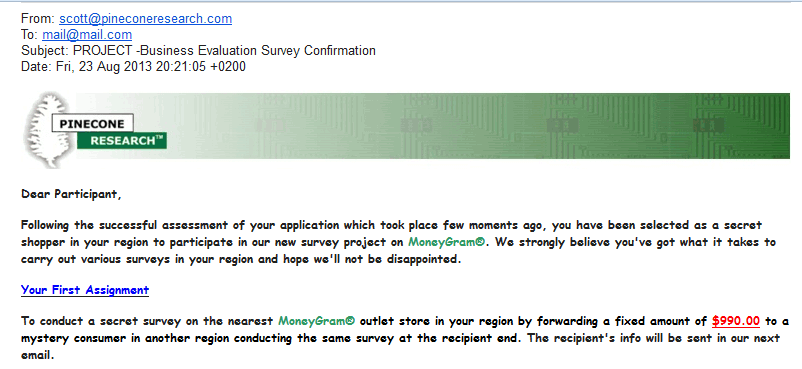
Notice how even SurveyPolice’s logo has been used in the email above! In a desperate attempt to gain the reader’s trust, these scammers have included our “approved survey panel” seal in the e-mail. Talk about distasteful.
Here’s an another fake email. This one offers a $150 “Evaluation Survey”.

Another fake email. This time, $150 for a Western Union & MoneyGram Evaluation survey!

(Thanks Nya for forwarding these e-mails!)
Another fake email, added February 24, 2014. This one asks for $1550 be wired via Western Union. Notice that the e-mail address is close but not an exact match to the real “[email protected].”
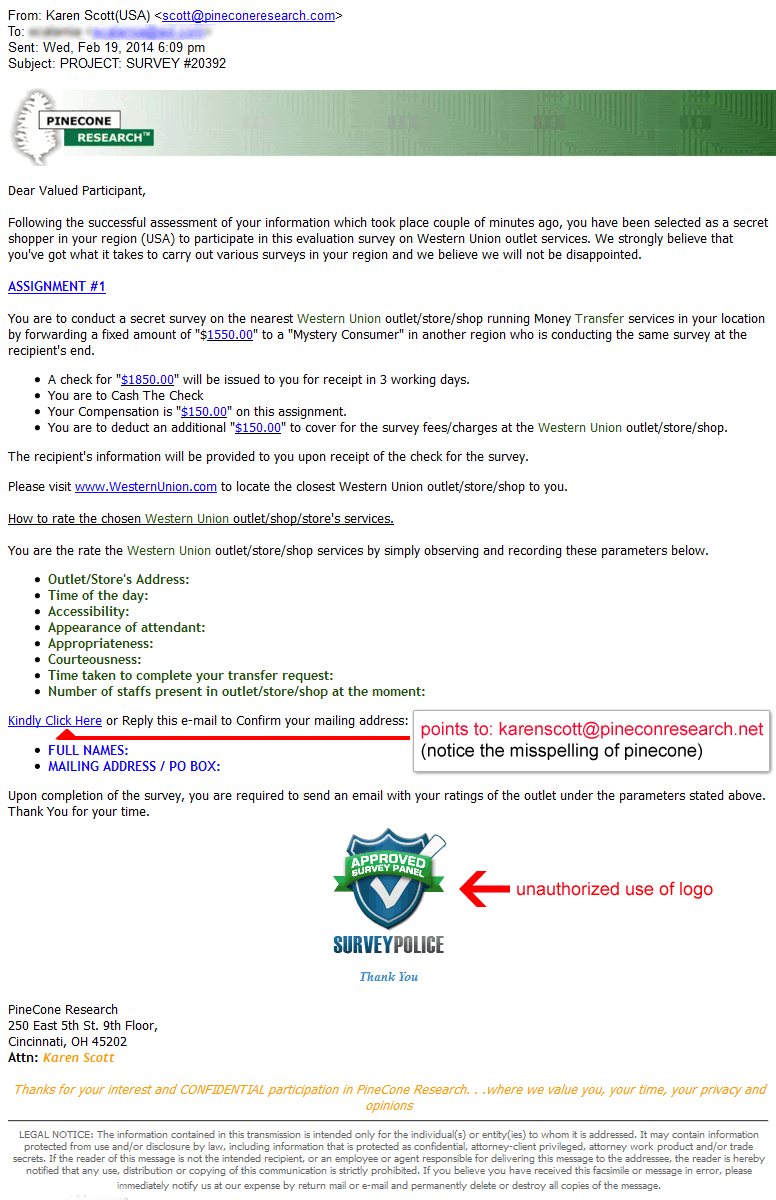
Another fake email, added June 22, 2014. This one again asks for $1550 be wired to a Western Union account, this time to an “Elizabeth Jean Dickman”. Notice that the reply and from e-mail address is [email protected], which is again, completely different from the real Pinecone Research’s e-mail address.
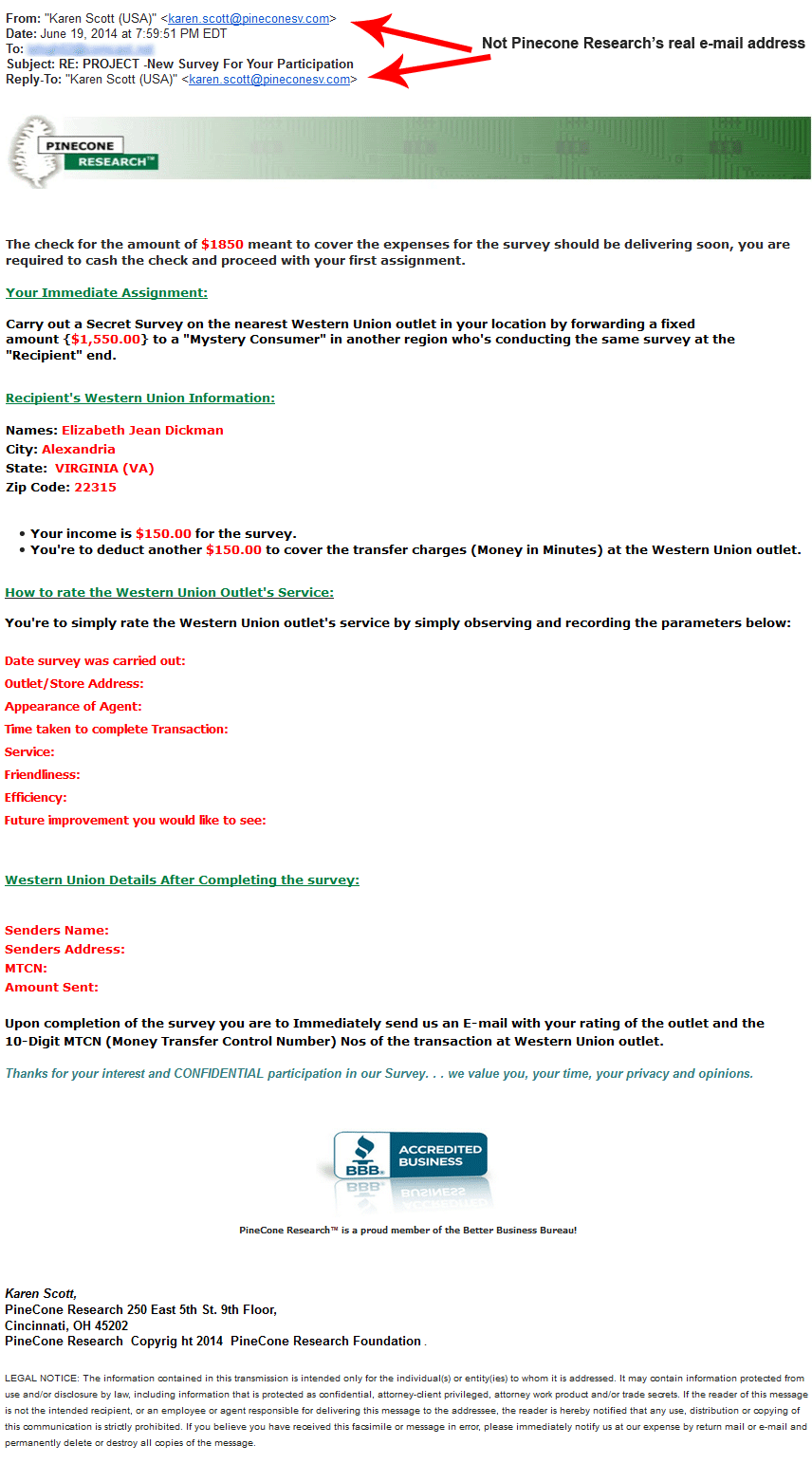
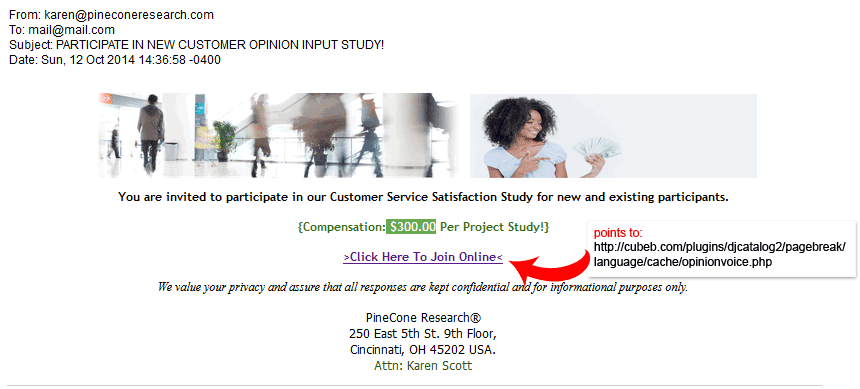
This fake check, added February 12, 2015 is for $1940. The recipient originally received an e-mail asking if they’d like to participate in a secret shopper assignment for Pinecone Research. They agreed and were mailed a fake check for $1800 with instructions on wiring $1500 to a Western Union account and keeping the remaining $300 for their participation. They agreed, the check bounced, and were then subsequently sent another fake check for $1940.
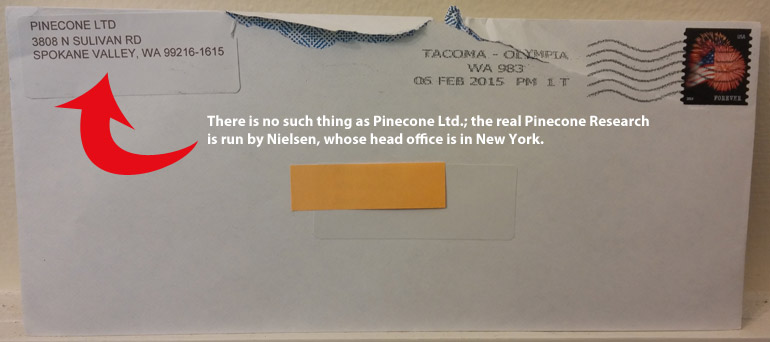
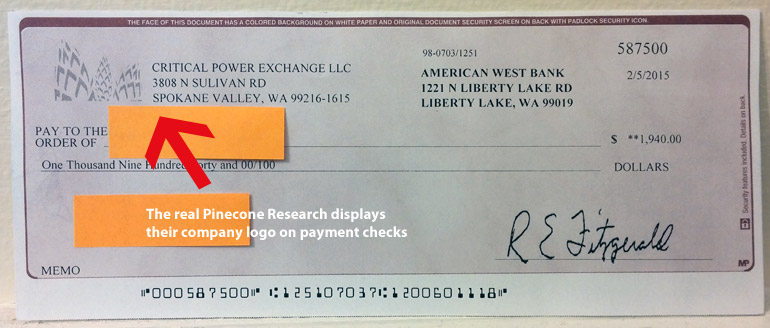
This fake email, added February 28, 2018 is making solicitations for Customer Service Evaluators who will supposedly be paid $500 for studies to be conducted at the nearest Walmart. The email is using graphics close to what the real Pinecone Research would use in some of their marketing materials, however makes an offer so generous and outrageous, that a legitimate market research company would go bankrupt if they offered an assignment like this! These fake emails are being sent from: [email protected].
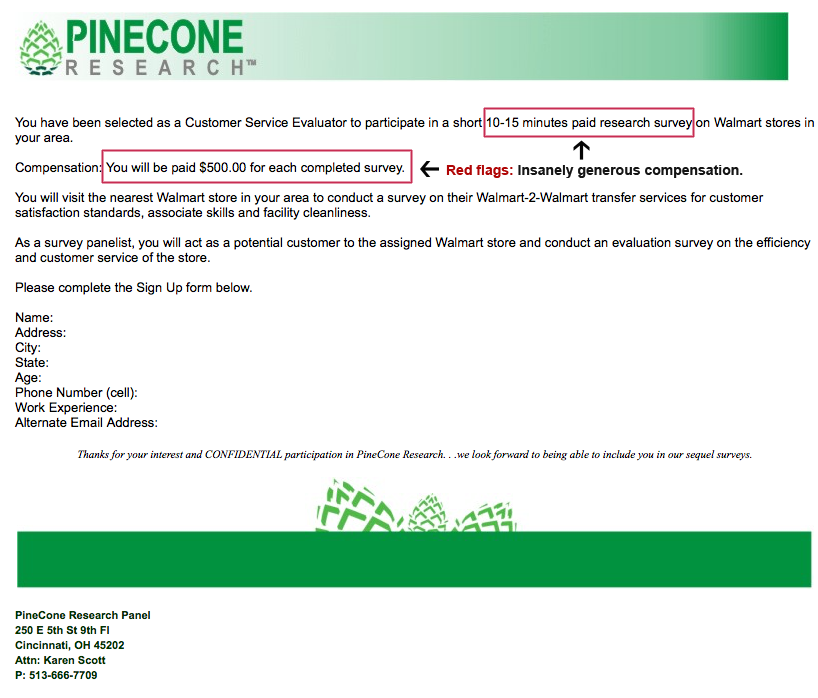
Tip! Don’t be fooled by logos, or other graphics that are displayed in the e-mail you receive. It is EXTREMELY easy to copy and paste (in other words, steal) images from other websites. It does not mean that the rightful owners of these images have allowed others to use the images.
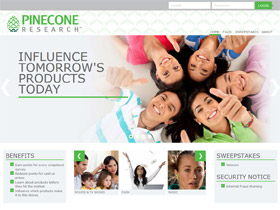 Pinecone Research is actually run by Nielsen, one of the world’s largest market research companies. Pinecone Research has consistently been one of the highest ranked panels on SurveyPolice, as they pay the incentives they promise to their members, on time, and without hassle. Rewards for taking surveys and participating in at home product testing include cash, gift cards, and more.
Pinecone Research is actually run by Nielsen, one of the world’s largest market research companies. Pinecone Research has consistently been one of the highest ranked panels on SurveyPolice, as they pay the incentives they promise to their members, on time, and without hassle. Rewards for taking surveys and participating in at home product testing include cash, gift cards, and more.
To become a member is 100% free. To join, visit their listing on SurveyPolice. Despite them being constantly targeted by scammers, they are actually a very good survey panel!
Share with us: Have a fake Pinecone Research check or e-mail you’d like to be shown here? Or have your own story to share about this scam? Please upload your images and comments in the section below! Or contact us if you’d prefer.
